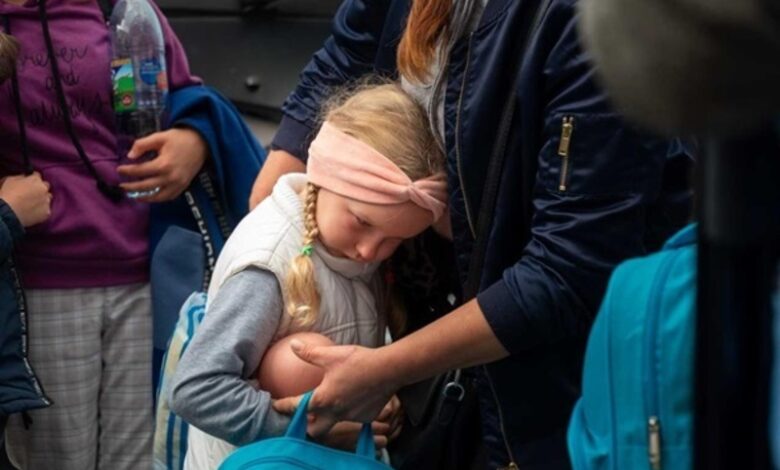Ukrainian refugees in Germany and malnutrition: new study on the link between poverty and food security

After the start of Russia’s full-scale invasion of Ukraine, millions of Ukrainians faced a difficult choice: stay in the country under fire or seek refuge abroad. One of the countries that accepted the most Ukrainian refugees was Germany. Since the beginning of the crisis, Germany has offered comprehensive support, including housing, social assistance, health insurance, access to education and language courses. However, despite this large-scale humanitarian gesture, Ukrainian refugees face serious difficulties. One of the most troubling issues highlighted by the latest research is food insecurity and malnutrition among some vulnerable populations.
Research, conducted by the German Nutrition Society (Deutsche Gesellschaft für Ernährung, DGE), shed light on the difficult situation faced by families on the verge of poverty. This research is an important step towards understanding how poverty affects the nutrition and, by extension, the health of these people. A significant part of the respondents in this study are Ukrainian refugees, which adds particular poignancy to the conclusions.
The MEGA_kids-Studie: a new look at the problem
The MEGA_kids-Studie, conducted by Hohenheim University and Charité Medical Center Berlin, surveyed 500 households with children. The aim of the study was to examine the relationship between poverty, food security and nutrition. It turned out that about 15% of the German population is at risk of poverty – that’s more than 12 million people. Largest families and single parents are at greatest risk.
One of the central themes of the study was the question of food security — whether people have access to sufficient quantities of nutritious and quality food. The results showed that vulnerable populations, including refugees, often face the psychological and physical impact of food insecurity. For example, some families are forced to limit their diet to cheap foods such as pasta with tomato paste, and in some cases, to skip meals altogether.
Malnutrition in Germany: the scale of the problem
The results of the study showed that three percent of the surveyed families face acute malnutrition, which means that people can go without food for a whole day due to lack of funds. Another quarter of respondents said they were moderately or severely malnourished. The main reason for this is the lack of financial resources, which forces people to limit not only the quantity, but also the quality of food.
Researcher Anja Zimmet from Hohenheim University noted that one of the key problems is psychological discomfort. People who do not have access to enough food often experience shame, anxiety and isolation. For example, parents may ask their children not to invite friends to their home because it is impossible to treat them. In some cases, people even turn down invitations to joint events, such as barbecues, because they know they won’t be able to reciprocate.
Ukrainian refugees in the center of attention
Among the surveyed respondents, 46% lived in Germany for less than a year, and 88% of them were Ukrainian refugees. This ratio is explained by the specificity of the selection of research participants, which was conducted among vulnerable categories of the population with the help of public organizations. Despite this, researchers emphasize that the problem of malnutrition among Ukrainian refugees is not more common than among other migrants or native Germans with low incomes. The study also notes that the majority (88 percent) of this group comes from Ukraine, so it is not possible to draw general conclusions that Ukrainian refugees in Germany are starving.
Ukrainian refugees in Germany receive significant social assistance, including basic social security (Bürgergeld), payment for medical services and housing, as well as funding for language courses. However, the problem of food security still affects part of this population category. Scientists assume that the reasons can be both economic and social. For example, Ukrainian refugees often face cultural barriers, social isolation and the psychological effects of war, which worsen their perception of their situation.
Psychological influence and social isolation
One of the most impressive aspects of the study was the identification of the social and psychological consequences of the problem of food security. According to a recent study, 70 percent of respondents experience anxiety, shame, discomfort, feelings of isolation and injustice – because they cannot afford to buy food that is available to other parents. Parents admitted that it is difficult for them to explain to their children why they cannot buy certain products that are available to others. This aspect of the problem is particularly relevant for refugees who have already experienced significant trauma due to war and displacement.
The MEGA_kids-Studie was an important step in understanding the problem of food security in Germany. It showed that even in high-income countries, a large part of the population faces difficulties in meeting basic needs. For Ukrainian refugees, this problem has a special dimension, as it overlaps with the social and psychological challenges caused by the war and adaptation to a new environment.
The problem of food security requires a comprehensive approach. Germany, which has demonstrated an example of effective humanitarian assistance, has the opportunity to deepen support, in particular through the provision of psychological assistance, reducing social isolation and promoting the integration of refugees into local communities. This will be an important step not only to support those affected by war, but also to build a more inclusive society.
This problem goes beyond Germany, because the issue of food security is relevant in many countries that host refugees. Germany’s experience can be a valuable lesson for others, showing that the integration of vulnerable populations is possible even under conditions of large-scale crises.





